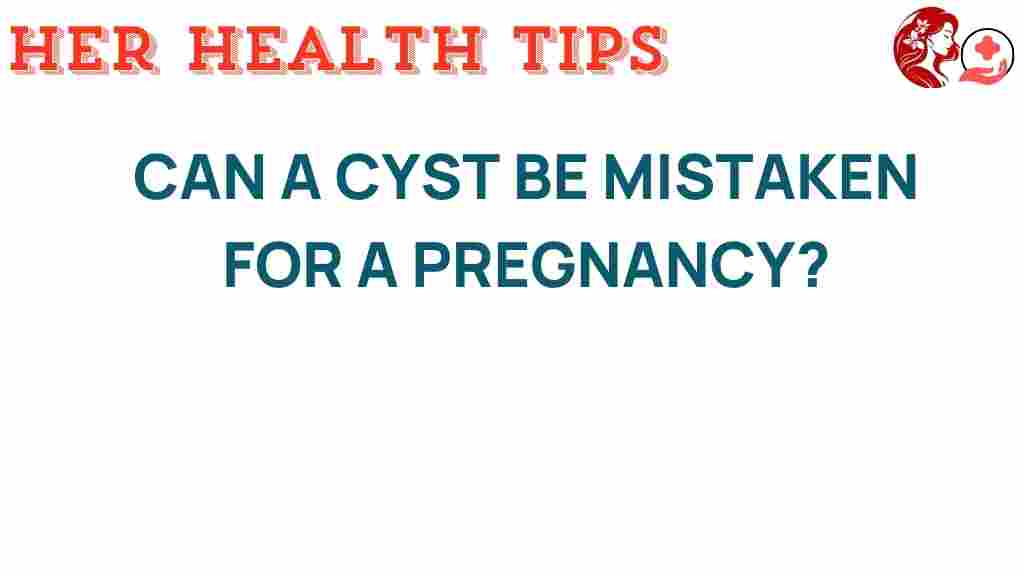Can a Cyst Be Mistaken for a Pregnancy?
Understanding women’s health is crucial, especially when it comes to recognizing the difference between various conditions that can affect reproductive health. One of the common concerns among women is whether a cyst can be mistaken for a pregnancy. In this article, we’ll unravel the confusion surrounding cysts and pregnancy, exploring their symptoms, diagnosis, and the prevalent misconceptions that can lead to unnecessary anxiety.
Understanding Cysts and Pregnancy
Cysts are fluid-filled sacs that can develop in various parts of the body, including the ovaries. They are often benign and may not cause any symptoms. On the other hand, pregnancy occurs when a sperm fertilizes an egg, leading to the development of an embryo. While these two conditions are distinctly different, some symptoms can overlap, leading to confusion.
Common Symptoms of Cysts and Pregnancy
When considering whether a cyst can be mistaken for a pregnancy, it’s essential to identify the common symptoms associated with each condition:
- Symptoms of Ovarian Cysts:
- Pelvic pain or discomfort
- Changes in menstrual cycle
- Bloating or swelling in the abdomen
- Pressure on the bladder or bowel
- Possible pain during intercourse
- Symptoms of Pregnancy:
- Missed menstrual period
- Nausea or vomiting (morning sickness)
- Breast tenderness or swelling
- Increased urination
- Fatigue
As we can see, there are overlapping symptoms such as pelvic pain and changes in menstrual cycles, which can lead to confusion. Understanding these symptoms is crucial for accurate diagnosis and treatment.
Diagnosis: How to Differentiate Between Cysts and Pregnancy
If you’re experiencing symptoms that could indicate either a cyst or pregnancy, it’s essential to seek medical advice. Healthcare providers typically use the following methods for diagnosis:
- Ultrasound: One of the most effective tools for diagnosing cysts and confirming pregnancy is an ultrasound. This imaging technique allows doctors to visualize the ovaries and any cysts present, as well as the developing embryo in case of pregnancy.
- Blood Tests: A blood test can confirm pregnancy by measuring levels of the hormone hCG (human chorionic gonadotropin). Elevated levels indicate pregnancy, while normal levels may suggest other issues, such as a cyst.
- Pelvic Examination: A healthcare provider may perform a pelvic exam to check for any abnormalities in the reproductive organs, including the presence of cysts.
It’s important to consult a healthcare professional for an accurate diagnosis, especially if you’re experiencing any concerning symptoms.
Misconceptions Surrounding Cysts and Pregnancy
Many misconceptions exist regarding cysts and pregnancy. Here are some common ones:
- A cyst always means you’re pregnant: This is false. While some cysts can develop during pregnancy, many women have ovarian cysts that are not related to pregnancy at all.
- All cysts require treatment: Not all cysts need treatment. Many cysts are harmless and resolve on their own.
- Pregnancy symptoms always indicate pregnancy: Symptoms like missed periods can be caused by conditions other than pregnancy, including hormonal imbalances or ovarian cysts.
Being informed about these misconceptions can help women make better health decisions and seek appropriate medical help when needed.
Step-by-Step Process for Addressing Symptoms
If you suspect you have a cyst or might be pregnant, follow these steps:
- Monitor Your Symptoms: Keep track of any symptoms you experience, including their intensity and duration.
- Take a Pregnancy Test: Use an over-the-counter pregnancy test if you suspect pregnancy. If positive, schedule a doctor’s appointment.
- Schedule a Doctor’s Appointment: Regardless of the outcome of the pregnancy test, consult with a healthcare provider to discuss your symptoms and concerns.
- Follow Medical Advice: Based on your examination and test results, follow your healthcare provider’s recommendations for treatment or further testing.
Taking these steps can help you gain clarity about your health and ensure that you receive the appropriate care.
Troubleshooting Tips for Common Concerns
Here are some troubleshooting tips for common concerns related to cysts and pregnancy:
- If You Have Unexplained Pelvic Pain: Don’t ignore it. Keep a diary of your symptoms and seek medical advice.
- If Your Period is Irregular: Track your menstrual cycle and discuss any significant changes with your healthcare provider.
- If You Experience Severe Symptoms: If you have severe abdominal pain, fever, or vomiting, seek immediate medical attention.
Taking proactive steps can help mitigate anxiety and ensure timely intervention if needed.
Conclusion
In conclusion, while cysts and pregnancy can share some overlapping symptoms, they are fundamentally different conditions. Understanding the symptoms, diagnosis, and common misconceptions can empower women to make informed health decisions. Always consult a healthcare professional if you have concerns about your reproductive health. For more information on women’s health, check out this resource.
Remember, knowledge is power when it comes to health, and being informed will help you navigate any uncertainties regarding cysts, pregnancy, and overall women’s health.
This article is in the category Reproductive and created by HerHealthTips Team
